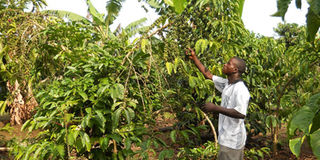Masaka farmers move to revive cooperative union

Boost. A coffee farmer in Bukomansimbi District tends to his trees. Many farmers in the area have been encouraged to grow coffee and sell to Masaka Cooperative Union. PHOTO BY MICHAEL J SSALI
What you need to know:
- Progress. The union has so far revived 86 of its more than 300 former coffee growers’ cooperative societies.
MASAKA. Masaka Cooperative Union (MCU) is one of the traditional cooperative unions in Uganda.
Others are Banyankole Kweterana Cooperative Union and Bugisu Cooperative Union.
Before MCU suffered setbacks as a result of political strife that befell the country in the 1970s and 1980s, the union was providing employment to thousands of people besides offering scholarships to students and engaging in other social support and development activities.
In an effort to regain its former glory, MCU has so far revived 86 of its more than 300 former coffee growers’ cooperative societies that were once scattered across Masaka Sub-region when it was registered in 1951.
According to Mr Emmanuel Ssenyonga, the MCU secretary manager, they are already marketing some coffee just as they used to do before.
“We are also providing our farmers with Robusta coffee seedlings because we want to boost coffee production. We are aware of the problems that have reduced coffee production recently such as the coffee wilt disease and we are selling resistant varieties,” he said during a recent interview with Daily Monitor.
He said MCU is also teaching farmers about natural environment preservation and encouraging them to plant trees.
“Like we used to do before, we have started with potting fruit trees and cloned South African eucalyptus tree seedlings at our Kitoma Farm site for sale to our farmers. In the 1970s when we planted fruits at the farm of some 100 acres at Kitoma in Buwunga Sub-county, Masaka District, many of the people we employed on the farm quickly discovered the economic benefits of growing passion fruit and pineapple. They began producing them on their individual farms as an extra source of income apart from coffee. Fruit growing then spread to other sub-counties and today almost the entire Masaka Sub-region is engaged in fruit growing, mainly pineapples, passion fruit and mangoes. We believe that tree farming will develop in a similar way,” he explained.
Mr Ssenyonga has nostalgic memories of MCU’s past and speaks passionately about the economic transformation it caused in the area before it collapsed in the early 1980s.
“Masaka Cooperative Union once provided employment to some 400 people and was a key driver in the economic development of the sub-region.
“Today, however, it is just a shadow of its former self. As a cooperative union, we had a fleet of commercial vehicles, coffee hurling factories, buildings, and a 5,200- acre cattle ranche in Sembabule District. All this is no more.”
He blames the low coffee quality from the sub-region on the collapse of MCU.
Recently, the Trade, Industry and Cooperatives minister, Ms Amelia Kyambadde said government was determined to awaken cooperative unions which played a pivotal role in helping farmers acquire farm inputs, markets, and better prices, among other things.
Ms Kyambadde said there is an ongoing process to compensate the unions that were affected during or after the 1986 war.
According to the minister, Masaka Cooperative Union was given Shs350m, with another Shs5b yet to be paid to the union.
But Mr Ssenyonga said the money the minister talks about has not yet been deposited on their account.


